Women in the Israel Defense Forces
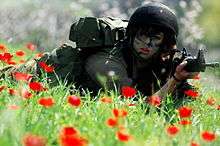
Women in the Israeli Defense Forces are female soldiers who serve in the Israel Defense Forces. Israel is one of only a few countries in the world with a mandatory military service requirement for women.[1][2][3]
According to the IDF, 535 female Israeli soldiers had been killed in combat operations between the period 1962-2016 (this figure does not include the dozens of female soldiers killed in Israeli service prior to 1962).[4] Women have taken part in Israel’s military before and since the founding of the state in 1948,[5][6] with women comprising over 20% of Israeli forces in 1948, and 33% of all IDF soldiers and 51% of its officers, in 2011,[7] fulfilling various roles within the Ground, Navy and Air Forces. The 2000 Equality amendment to the Military Service law states that "The right of women to serve in any role in the IDF is equal to the right of men."[3] As of now, 88% to 92%[8] of all roles in the IDF are open to female candidates, while women can be found in 69% of all positions.[1]
Formerly women conscripts served in the Women's Corps, commonly known by its Hebrew acronym, CHEN. After a five-week period of basic training they served as clerks, drivers, welfare workers, nurses, radio operators, flight controllers, ordnance personnel, and course instructors.[9]
History
Pre-state military service for women
Before the establishment of the state, women served in combat roles in the militias that would become the Israel Defense Forces.[6] The rate of women who took part in combat organizations stood at 20%.[3] At the years before the establishment of the IDF, military service for women existed in the lines of the Shomer and Hagana organizations. The Hagana stated in its law that its lines were open to: "Every Jewish male or female, who is prepared and trained to fulfill the obligation of national defense." Most served as medics, communications specialists, and weaponeers. During WWII approximately 4,000 females volunteered for service in the British assisting forces. One of them, Alice Hatzor-Hirsch, was about 16 when she joined the Hagana. In 1942, she joined the British army as a driver. "We were more connected than the others," she recalled years later. "A girl becoming a driver in the British army was considered the height of boldness at the time."[10]
In Tel-Aviv of the 1940s, a battalion was established in which women filled positions in security, weapons transport, and manned anti-aircraft posts. During the winter of 1948, women joined the combat soldiers of the Palmach, who traveled from Tel Aviv to Jerusalem with their weapons concealed in their clothes. The Palmach arm (thirty percent of which were females) trained nine female platoon commanders, and other female squad commanders.[10]

Israeli War of Independence
On 26 May 1948, Prime Minister David Ben Gurion officially set up the IDF as the country's army. On 18 August 1948, mandatory conscription for single and married women without children (born between the years 1920-1930) began.[11]
Women served in many positions including nurses, signal operators, drivers, clerks, cooks and more. The Women's Corps, under which all women served, was responsible for taking care of women soldiers' needs and for their training and integration into different IDF units. The Women's Corps also sent young women soldiers to be teachers in developing areas and immigrant neighborhoods of Israel.[11]
State of Israel


Apart from the 1948 Arab-Israeli War, when manpower shortages saw many Palmach and IDF women taking active part in land battles, women were historically barred from battle in the IDF, serving in a variety of technical and administrative support roles. Soon after the establishment of the IDF, the removal of all women from front-line positions was decreed. Decisive for this decision was the very real possibility of falling into enemy hands as prisoners of war. It was fair and equitable, it was argued, to demand from women equal sacrifice and risk; but the risk for women prisoners of rape and sexual molestation was infinitely greater than the same risk for men.[12] A majority of women serving in the IDF then were secretaries. The rest served primarily as instructors, nurses, clerks and telephone operators. A few women flew transport missions in the 1950s and a few women were accepted into flight training in the 1970s, but did not complete the program before it was closed to women.[2]
The army is the supreme symbol of duty and as long as women are not equal to men in performing this duty, they have not yet obtained true equality. If the daughters of Israel are absent from the army, then the character of the Yishuv will be distorted.
Yael Rom, the first female pilot trained by the Israeli Air Force, earned her wings in 1951.[13] Hava Inbar, a lawyer, was appointed the judge of the military court in Haifa in September 1969, thus becoming the first female military judge in the world. "I do not know if I want to be a military judge my whole life," she said in an interview, "but I am glad that I was appointed; it proves that the IDF leaves almost all doors open for its female soldiers."[10]
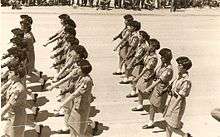
During the Yom Kippur War, due to a growing need for ground forces, women were needed in roles in the field.[6] According to Rina Bar-Tal, chair of the Israel Women's Network, roles for women beyond technical and secretarial support only started to open up in the late 1970s and early '80s, because of manpower shortages. Since then, a few women have earned ranks higher than colonel. In 1986, Amira Dotan, then head of the Women's Corps, became the first female brigadier-general.[2]
Gender equality
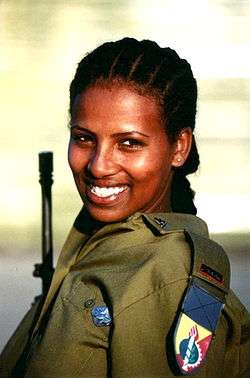
.jpg)

Civilian pilot and aeronautical engineer Alice Miller successfully petitioned the High Court of Justice to take the Israeli Air Force pilot training exams, after being rejected on grounds of gender. Though president Ezer Weizman, a former IAF commander, told Miller that she'd be better off staying home and darning socks, the court eventually ruled in 1996 that the IAF could not exclude qualified women from pilot training. Even though Miller would not pass the exams, the ruling was a watershed, opening doors for women in new IDF roles. Female legislators took advantage of the momentum to draft a bill allowing women to volunteer for any position, if they could qualify.[2]
In 2000, the Equality amendment to the Military Service law stated that "The right of women to serve in any role in the IDF is equal to the right of men."[3] The amendment that female lawmakers had drafted granted equal opportunities to women found physically and personally suitable for a job. The question of who and what was "suitable" was left to the discretion of military leaders on a case-by-case basis. Women did start to enter combat support and light combat roles in a few areas, including the Artillery Corps, infantry units and armored divisions. A few platoons named Carakal were formed for men and women to serve together in light infantry. By 2000 Carakal became a full-fledged battalion. Many women would also join the Border Police.[2]
The first female jet fighter pilot, Roni Zuckerman, received her wings in 2001.[13] By 2006, the first female pilots and navigators graduated from the IAF training course, and several hundred women entered combat units, primarily in support roles, like intelligence gatherers, instructors, social workers, medics and engineers. When the Second Lebanon War broke out, it was the first time since 1948 that women were in field operations alongside men. Airborne helicopter engineer Sgt.-Maj. (res.) Keren Tendler was the first female IDF combat soldier to be killed in action.[2] In November 2007 the Air Force appointed its first woman deputy squadron commander.[14]
On 23 June 2011, Orna Barbivai became the first female Major-General in the IDF upon her promotion to the role of commander of the Manpower Directorate. She is the second woman to serve on the General Staff.[15][16] In 2012, Capitan Merav Buchris became the first female ammunition Officer in the Air force,[17] she started her military career as a Shoher at the Technical Academy in Haifa. In 2013, in a first, a female IDF soldier was called up to the Torah during a service on a military base.[18] Also in 2013, the IDF announced they would, for the first time, allow a (MTF) transgender woman to serve in the army as a female soldier.[19]
In 2014, there were several more firsts for women in the IDF. The IDF appointed Major Oshrat Bacher as Israel's first female combat battalion commander;[20] Dr. Shani became the first female combat doctor in an elite counterterror unit in the IDF (specifically, the Duvdevan counterterrorism unit);[21] and the IDF decided to allow female kosher supervisors to work in its kitchens on military bases.[22]
Service
Mandatory service for women in the IDF is 24 months, apart from roles specified in law which require a service length of 36 months.[23] Women may be exempted from military service for reasons of religious conscience, marriage, pregnancy or motherhood. A woman may receive an exemption on religious grounds under the following conditions:[24]
- She has declared that for reasons of conscience, or a religious way of life, she is prevented from doing military service and has proven this to the satisfaction of the exemption committee.
- She keeps the laws of Kashrut at home and outside.
- She does not travel on Shabbat.
Women who arrive in Israel at age 17 and over are generally exempt from army service, but may serve on a voluntary basis. Also, women (who are not fighters) are not generally called up for reserve duty if they are married or if they are beyond age 24.[24]
Combat roles
.jpg)
Clause 16A of the military service law requires that female combat soldiers serve 2 years and 4 months of mandatory service, and continue in reserves service up to age 38.[1] Each year, 1,500 female combat soldiers are drafted into the IDF.[5] Women currently make up 3% of the IDF's combat soldiers.[7] Women were employed in full combat roles during the War of Independence and early years. An incident involving the abuse of a woman's corpse led to their withdrawal from full combat[25] until 2000, when the Caracal Battalion was raised.
In 2014, the IDF appointed Major Oshrat Bacher as Israel’s first female combat battalion commander.[20]
A combat option for women is the Caracal Battalion, which is a light infantry force that is made up of 70 percent female soldiers.[3] The unit undergoes training like any combat infantry.[5] The IDF commando K9 unit, Oketz, also drafts females as combat soldiers.[7]
Women's affairs advisor

The Women's Corps was dismantled in 2000, so that female soldiers for the first time would fall under the authority of individual units based on jobs and not on gender. They would wear the insignia of their units instead of the insignia of the Women's Corps.[2] The position of Women's Affairs Advisor to the Chief of Staff was created in 2001. The female officer holding the position is in charge of ensuring more opportunities and a suitable environment for female soldiers, as well as better enhancing their skills. The mission of the advisor is described by the IDF as "empowering women, the IDF and Israeli society by promoting conditions that allow for the optimal use of the capabilities of women serving in the IDF; promoting equal opportunities for women during their military service; and assimilating women into military leadership positions."[7]
Service exemptions
Sixty–five percent of Israeli women serve in the army, 25 percent opt out on religious grounds, the remainder are exempted for physical, emotional or marital reasons.[26] A law passed in 1978 made exemptions for women on religious grounds automatic upon the signing of a simple declaration attesting to the observance of orthodox religious practices. This legislation raised considerable controversy, and IDF officials feared that the exemption could be abused by any nonreligious woman who did not wish to serve and thus further exacerbate the already strained personnel resources of the IDF. Women exempted on religious grounds were legally obliged to fulfill a period of alternative service doing social or educational work assigned to them. In practice, however, women performed such service only on a voluntary basis.[9]
2007 Segev Committee report
.jpg)

In 2007, then Head of Manpower Directorate, Aluf (Maj. Gen.) Elazar Stern, appointed a committee to define women's service in the IDF in the next decade, with the objective of increasing equal opportunities in women's service in the IDF.[3] The committee, headed by Maj. Gen. (res.) Yehuda Segev, submitted its report to Stern in September 2007.[27]
In September 2008, the 100-page report was presented to the IDF General Staff. Rav Aluf Gabi Ashkenazi, then-Chief of Staff, voiced support for the committee's vision:[3]
The IDF, as a leading organization in Israeli society, designates the service of men and women to a fulfilling and respectful service based upon equal opportunities in the service of [the] IDF and the State of Israel.
.jpg)
The committee called for the annulment of the model that has been in place since the 1950s, under which a soldier's length of service and service options is largely determined by gender. "This is an archaic model that causes under-utilization of the resources ... of half of Israeli society, and closes off many opportunities, both during service and for integrating into society after service," the report said.[27]
In 2007, 12 percent of all army jobs were completely closed to women. The report partially attributed it to the shorter length of service, as a barrier to putting women in the most demanding and important jobs. Hence postings are "to a large extent" determined by gender rather than a soldier's talents and abilities. Instead, the length of service "should depend solely on the job, rather than on one's gender."[27]
The report advised making it harder for women to get an exemption from mandatory service and curbing the phenomenon of women falsely claiming exemptions on religious grounds. It also said the criteria for exemptions from service should be the same for both men and women.[27] The panel recommended mandatory quotas for promoting women, with the goal of giving women a "significant presence" in the army's "senior decision-making ranks." In addition, it called for creating an effective, well-funded system to ensure proper working environments for both men and women, and for drafting a "gender code" that would lay down explicit rules for interaction between the sexes. "There should be no jobs or units categorically closed to either women or men," it said. "Service in all units, postings and missions would be joint, subject to the rules of appropriate integration."[27]
The committee proposed opening all jobs to women aside from a handful to be determined by a special committee, whose decisions would require the approval of the Chief of Staff, the Defense Minister and the Knesset Foreign Affairs and Defense Committee. It said the initial screening and assignment process should be unified so that men and women are part of the same system and receive their assignments based on the same criteria, including for acceptance into combat units. The panel proposed implementing this change gradually over the course of a decade.[27]
Issues

Religious objections
In 1950, then-chief rabbis Yitzhak HaLevi Herzog and Ben-Zion Meir Hai Uziel issued a ruling forbidding women to join the IDF.[28] In the 1980s, Rabbi Meir Kahane ardently opposed women serving in the IDF, advocating national service instead.[29] As of 2014 David Lau and Yitzhak Yosef of the Chief Rabbinate are opposed to religious women serving in the IDF, as is Safed Chief Rabbi Shmuel Eliyahu.[30] However, Finance Minister Yair Lapid opposes this position and wants Lau and Yosef to be removed from the Chief Rabbinate because of it. Economy Minister Naftali Bennett stated "I believe that all girls should do either IDF service or national service. With that, the attack on the rabbis for their traditional position is an unacceptable attack on the respect due them."[31] Education Minister Shai Piron said he backs the chief rabbis’ injunction against observant women enlisting in the IDF.[32] In 2003 Piron had said, “I don’t know of any rabbis that would allow [observant women] to serve in the army. The halachic authorities saw the reality from a joint education and spiritual perspective, this view led them to their halachic conclusion… The problem with IDF service is the general atmosphere that does not allow for a life without [religious] pitfalls.”[33] MK Elazar Stern said, "A week ago the Chief Rabbis announced that a female serving in the IDF results in an aveira similar to Chilul Shabbos. This is tantamount to issuing a call to women, at least those who view themselves as religious, not to serve in the IDF...I served in the IDF for a few years and I state the military cannot function without women unless we lengthen the service of males to 4.5 years. The price that we will pay by the call of the Chief Rabbinate Council that females do not enlist is not that of our daughters, but the daughters of these very same rabbis who don't serve."[34] Rabbi Shlomo Riskin, the Rabbi of the city of Efrat, supports women's enlistment in the IDF.[35] Also, in 2014 the Beit Hillel association of national-religious rabbis issued a ruling in Jewish law stating that women are allowed to serve in the IDF; however, Rabbi Shlomo Aviner claimed that Beit Hillel did not have the authority to make such a ruling.[36]
Currently, observant Jewish women are allowed to forgo enlisting in the IDF in favor of doing national service.[31]
The IDF offers Haredim "women free and secular free" recruitment centers. Defense Minister Moshe Ya'alon expressed his willingness to relax regulations to meet the demands of ultra-Orthodox rabbis. Regulations regarding gender equality had already been relaxed so that Haredim could be assured that men would not receive physical exams from female medical staff.[37]
Sexual harassment
In Israel and Its Army: From Cohesion to Confusion, Stuart A. Cohen has argued that prior to the 1990s, there had existed a general consensus in the IDF that "sexual prowess goes hand in hand with military accomplishment." Even when social attitudes were changing in the 1980s, the IDF was still inclined towards tolerance and a senior army official warned of not blowing the "topic out of all proportion."[38] In 1993, the Maariv reported that only 10% of around 1,000 reported cases of sexual harassment each year are investigated.[39] Reports of sexual harassment against women in the Israeli army reached an average of one a day in 1999, an increase on the 280 complainants received in 1997. In 1998-99, 54 officers were expelled from the army on such charges, others faced demotion or prison. In one high-profile case, General Yitzchak Mordechai was charged with sexual assault and harassment. Another case involved the promotion of General Nir Galili after being accused of grooming a young female recruit for intimate relations. This issue has led the Israeli military being described by the feminist American writer Laura Sjoberg as a "hothouse for exploitive sexual relationships" and a force whose fighting culture is based on "rampant licentiousness."[40] While the army has since tried to curb sexual harassment, it remains a problem. In 2004, it was reported that 1 in 5 women soldiers suffer sexual harassment.[41]
Singing controversy
In September 2011, because of a religious ban on men hearing women sing,[42] nine religiously-observant cadets in the IDF officer's course walked out of an evening seminar on the legacy of the 2008 Operation Cast Lead in Gaza when a band comprising two male and two female vocalists took the stage to sing. The commander of the school expelled four of them, after they said they would disobey orders again. The IDF agreed to re-examine regulations on this issue, given the growing number of Haredi soldiers in combat units.[43] In October 2011, women soldiers were ordered to leave a post-Simhat Torah celebration on orders from IDF rabbis, and asked to dance in a separate area.[44] In November 2011, nineteen reserve Major Generals sent a protest letter to Defense Minister Ehud Barak and IDF Chief of Staff Benny Gantz and warned against harming the motivation of women to serve in the army and undermining "the fundamental values of Israeli society." [44]
Gallery
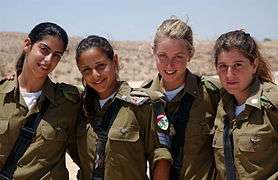 IDF officer cadets
IDF officer cadets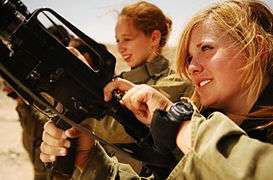 Female soldiers of the IDF
Female soldiers of the IDF Shooting practice
Shooting practice IDF women soldiers
IDF women soldiers Female soldiers of the Israeli Defense Forces at a train station in Hod Hasharon
Female soldiers of the Israeli Defense Forces at a train station in Hod Hasharon IDF female infantry instructor
IDF female infantry instructor Field Training Week in Southern Israel (2006)
Field Training Week in Southern Israel (2006) Field Training Week in Southern Israel (2006)
Field Training Week in Southern Israel (2006)- IDF Warrant Officers training (2014)
 Female combat soldier taking part in the IDF-wide Combat Fitness Competition (2010)
Female combat soldier taking part in the IDF-wide Combat Fitness Competition (2010).jpg) IDF female tank instructors of the School of Infantry Professions conducted a drill
IDF female tank instructors of the School of Infantry Professions conducted a drill.jpg) An Israel Defense Forces soldier of the unisex Caracal Battalion armed with CTAR-21 with Meprolight 21 reflex sight.
An Israel Defense Forces soldier of the unisex Caracal Battalion armed with CTAR-21 with Meprolight 21 reflex sight.
See also
| Wikimedia Commons has media related to Female soldiers of the Israel Defense Forces. |
References
- 1 2 3 "Statistics: Women's Service in the IDF for 2010, 25 Aug 2010". Israel Defense Forces. 25 August 2010. Retrieved 22 March 2011.
- 1 2 3 4 5 6 7 Feldinger, Lauren Gelfond (September 21, 2008). "Skirting history". The Jerusalem Post. Retrieved 2011-03-22.
- 1 2 3 4 5 6 7 "Integration of women in the IDF". Israeli Ministry of Foreign Affairs. 8 March 2009. Retrieved 23 March 2011.
- ↑ Israeli woman who broke barriers downed by Hezbollah rocket as 2006 combat volunteer
- 1 2 3 "Women in the IDF". Israel Defense Forces. 7 March 2011. Retrieved 22 March 2011.
- 1 2 3 "60 Years of Women's Service in the IDF". Israel Defense Forces. Retrieved 22 March 2011.
- 1 2 3 4 "More female officers in more positions in the IDF" (Press release). IDF spokesperson. 30 November 2011. Retrieved 8 December 2011.
- ↑ "Women of the IDF". IDF Spokesperson's Unit. Retrieved 22 January 2012.
- 1 2 "Israel". Lcweb2.loc.gov. Retrieved 2014-04-22.
- 1 2 3 Ben-Ari, Bar (1 August 2007). "A Woman of Valor". Israel Defense Forces. Retrieved 23 March 2011.
- 1 2 3 "The Beginning, Women in the Early IDF". IDF Spokesperson. 7 March 2011. Retrieved 14 August 2011.
- ↑ Dr. Netanel Lorch (May 31, 1997). "SPOTLIGHT ON ISRAEL: The Israel Defense Forces". Israel Ministry of Foreign Affairs. Retrieved 2010-06-10.
- 1 2 "First woman pilot in Israeli Air Force dies". The Jewish news weekly of Northern California. June 2, 2006. Retrieved 2010-06-10.
- ↑ Yuval Azoulay (November 28, 2007). "Israel Air Force appoints first female deputy squadron commander". Haaretz.com. Retrieved 2010-06-10.
- ↑ Greenberg, Hanan (26 May 2011). "IDF names first female major general". Yediot Ahronot.
- ↑ "Israeli Army Celebrates First Female Major General". IDF Spokesperson's Blog. IDF Spokesperson. 23 June 2011. Retrieved 4 July 2011.
- ↑ "The Israeli Air Force : First Time Around". Iaf.org.il. 2012-02-27. Retrieved 2014-04-22.
- ↑ Newman, Marissa (2013-09-30). "Female soldier called up to Torah on military base". The Times of Israel. Retrieved 2014-04-22.
- ↑ "Transgender in the IDF". AWiderBridge. 2013-08-07. Retrieved 2014-04-22.
- 1 2 Ben-Zvi, Gidon (2 January 2014). "First Lady: IDF Appoints First Female Combat Battalion Commander". Algemeiner Journal. Brooklyn, New York, United States: Simon Jacobson. Retrieved 15 January 2014.
History was made on Wednesday when the Israel Defense Forces appointed Major Oshrat Bacher as Israel’s first female combat battalion commander, Israeli daily Ma’ariv reports.
- ↑ "IDF welcomes first female combat doctor in elite counterterror unit". Israel Hayom. 2014-01-09. Retrieved 2014-04-22.
- ↑ "IDF To Allow Female Kosher Supervisors To Work on Military Bases –". Forward.com. 2014-01-09. Retrieved 2014-04-22.
- ↑ "Service Length for Women" (in Hebrew). Israeli Defense Forces. Retrieved 23 March 2011.
- 1 2 "Military Service 2nd Edition" (PDF). Israeli Ministry of Immigrant Absorption. Retrieved 23 March 2011.
- ↑ Israeli woman who broke barriers downed by Hezbollah rocket as 2006 combat volunteer
- ↑ Anne R. Bloom: Women in the Defense Forces, in: Swirski, Barbara und Safir, Marylin P.: Calling the equality bluff – Women in Israel, New York 1991, p. 141.
- 1 2 3 4 5 6 Harel, Amos (30 November 2011). "IDF freezes implementation of report calling for gender equality". Haaretz. Retrieved 30 November 2011.
- ↑ "Rabbinical association says permissible in Jewish law for women to serve in IDF".
- ↑ Kahane, Meir. "Women in the IDF". mkwords.com.
- ↑ "Lapid: Fire Chief Rabbis over objection to religious women's service in the army | JPost | Israel News". JPost. 2013-02-05. Retrieved 2014-04-22.
- 1 2 Lis, Jonathan (2014-01-13). "Israeli ministers spar over women serving in army - National Israel News". Haaretz. Retrieved 2014-04-22.
- ↑ Newman, Marissa (2014-01-13). "Education minister backs rabbis' ban on Orthodox women in IDF". The Times of Israel. Retrieved 2014-04-22.
- ↑ Newman, Marissa (2014-01-13). "Education minister backs rabbis' ban on Orthodox women in IDF". The Times of Israel. Retrieved 2014-04-22.
- ↑ "The Yeshiva World Stern Joins Lapid in Condemning the Chief Rabbis « » Frum Jewish News". Theyeshivaworld.com. 2014-01-16. Retrieved 2014-04-22.
- ↑ "Rabbi Riskin on Women's Enlistment: It's a Mitzvah - Jewish World - News". Israel National News. 2014-01-21. Retrieved 2014-04-22.
- ↑ "Rabbinical association says permissible in Jewish law for women to serve in IDF".
- ↑ http://www.ynetnews.com/articles/0,7340,L-4586197,00.html
- ↑ Stuart A. Cohen. Israel and Its Army: From Cohesion to Confusion, pg. 66-67
- ↑ Susan Starr Sered. "A Cultural Climate in the IDF That Legitimises Sexual Harassment of Women Soldiers", in What Makes Women Sick?: Maternity, Modesty, and Militarism in Israeli Society, UPNE, 2000. pg. 92
- ↑ Laura Sjoberg, Sandra Via. Gender, War, and Militarism: Feminist Perspectives (2010). pg. 87
- ↑ Stuart A. Cohen Israel and Its Army: From Cohesion to Confusion pg. 68
- ↑ Rabbi Eliezer Melamed, Military Orders that Contradict Jewish Law
- ↑ Amos Harel (2011-09-14). "IDF: Soldiers cannot skip ceremonies with women singing". Haaretz. Retrieved 2011-12-31.
- 1 2 Yair Ettinger (2011-11-17). "Top settler rabbi: Soldiers will sooner choose death than suffer women's singing". Haaretz. Retrieved 2011-12-31.